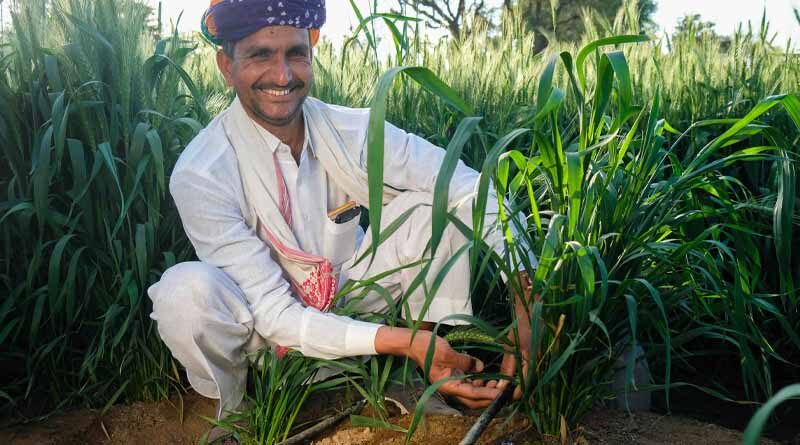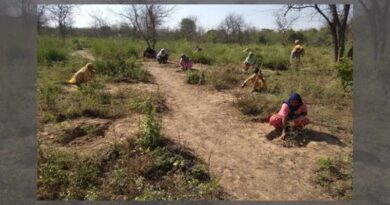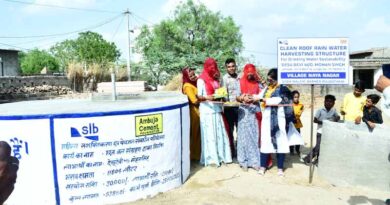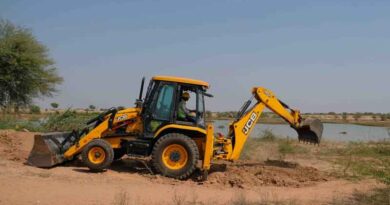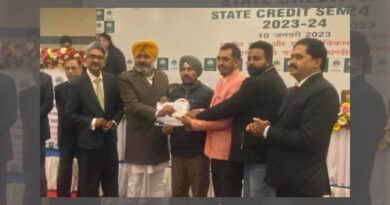Ambuja Cement Foundation working with farmers to improve soil health and crop productivity
Exclusive Interview: Mr. Chandrakant Kumbhani, Vice President at Ambuja Cement Foundation (ACF) with Mr. Nimish Gangrade, Krishak Jagat
17 March 2023, New Delhi: Ambuja Cement Foundation (ACF) is working in the field of agriculture development, water management, environment-friendly farming practices along with community development related objectives like social welfare, health, women empowerment, education and skill development in rural areas of India.
We at Krishak Jagat did an exclusive interaction with Mr. Chandrakant Kumbhani, Vice President-Communicy Development Initiatives at Ambuja Cement Foundation (ACF) on how the foundation is working on water management and climate change in India. The interaction explores strategies and solutions adopted by the foundation to tackle challenges in the rural Indian environment.
1. What strategies has ACF implemented to address water management and climate change?
ACF focuses on three major aspects of water management across locations – (1)Water Harvesting for groundwater recharge and direct use by building new harvesting structures and rejuvenation of traditional systems; (2) Enhancing and Ensuring Drinking Water Security by encouraging households to build rooftop rainwater harvesting systems at household level and building water distribution system with a focus on water quality, quantity and access to drinking water; and (3) Water Efficiency by training farmers to improve water use in agriculture by promoting micro-irrigation and other agronomic practices.
ACF works in varied regions – from coastal belts, deserts, hilly regions, and rainfed or semi-arid areas where the availability of water is essential for securing crops. For example in the desert or semi-arid areas, ACF works alongside farmers by providing them with capacity building and encouraging them to construct farm ponds or building other water harvesting structures to secure water during intermittent dry spells to enable irrigation of crops which is most critical for the survival of the crops.
In Himachal Pradesh, ACF focuses on watershed management by rejuvenating natural resources which have been degraded over the last many years. Watershed treatment has many benefits, including enhancing drinking water, and water for livelihoods, ensuring better soil and moisture conservation and also enhancing biodiversity, and improving the overall health of the ecosystem.
To bring more resources and work in a collaborative effort, ACF partners with various like-minded organizations. It has been an implementation agency for the past 30 years, working together with NGOs, government, and corporates to reach rural communities and improve indicators to achieve SDG goals. ACF has been working closely with NABARD for the past 15 years on the water in regions like Himachal Pradesh on Integrated Watershed Development Projects, which has helped in the rejuvenation of natural resources much needed for the livelihoods of the communities. The interventions are also helping communities get better prepared and adapt to changing climate impacting their income from agriculture.
ACF has also been preparing communities to address climate change by building capacity and also building People’s Institutions which help sustain projects and bring about community transformation.
2. How has ACF been successful in preparing communities for the effects of climate change on water resources?
ACF builds the capacity of communities to prepare them for climate change and the resultant impact on crops. We also help them to practice intercropping so that they are not highly dependent on the main crop.
We encourage farmers to build systems like farm ponds or to recharge community water sources which can be used for irrigation purposes and manage to save the main crop during the long dry spells during the monsoon season.
We have also realized that apart from water, soil health is an important component that is deteriorating very fast due to several reasons including monocropping, excessive use of chemicals, etc. ACF promotes interventions related to soil and moisture conservation and is working across locations with farmers to improve soil health and ultimately crop productivity.
ACF has facilitated the formation of Water User Associations or Village/Watershed Development Committees to take charge of managing assets created in the projects ensuring the sustainability of projects over the long run. By building such institutions there is not only the sustainability of the project invested in but also the overall prosperity and transformation of the entire village.
3. What are the key challenges that ACF faces in managing water resources in the face of climate change?
Many barriers exist when it comes to communities adopting climate change adaptation measures. Limited resources and information – including knowledge, technology, and finances to facilitate adaptation measures – make adopting changes prohibitive.
Additionally, there are many social barriers to climate change adaptation – psychological and behavioral ones, that influence how people react to climate stress and change. Simply put, many people just do not like change, while others opt to ‘wait and watch’ for the impacts, before making changes – suffering the consequences as a result.
As such, ACF works with communities to help educate and hand-hold them in implementing climate change adaptation measures. This is necessary, also because climate change is resulting in very unpredictable weather patterns, with extensive rainfall, cyclones, and long dry spells of drought wreaking havoc on communities and livelihoods. Increasing temperatures are impacting crop outputs. Cyclone Tauktae in 2021 had hit the coastal areas of Gujarat and severely impacted crops especially plantations like mango and coconut and livelihoods were destroyed overnight. Climate change is seeing the rise in such natural disasters, and communities have to prepare accordingly.
4. What innovative solutions has ACF promoted to ensure sustainable water management?
We follow an integrated water resource management approach where all solutions are covered under a holistic approach to water management – from water harvesting to the renovation of community ponds to using mined-out areas to recharging the entire area, to ensuring drinking water in the villages as well as water demand management in agriculture by promoting efficient use And part of ensuring sustainability we go ahead and build people’s institutions who take ownership for these structures and initiatives to ensure the community has water all year round.
We also promote rooftop rainwater harvesting structures as a simple but effective solution for drinking water at the household level. It is a one-time investment but can provide a family with water all year round once it is filled during the rainy season. This helps in reducing women’s drudgery with women being able to secure water right at their doorsteps.
As part of water efficiency, we have also been encouraging farmers to install micro-irrigation systems to manage the demand and improve water use efficiency and water productivity which is poor in traditional irrigation systems which most farmers are following.
ACF has also initiated a participatory groundwater management initiative offering communities to take charge of the aquifers, install systems to enhance groundwater recharge, and also conduct a water budget for their community – carefully monitoring the extraction of water from groundwater to ensure demand does not outstrip supply.
5. How does ACF plan to scale up its efforts to address water management and climate change in the future?
We are encouraging group-based initiatives for farmers and communities to work collectively to inculcate better solutions and generate water prosperity. In West Bengal and Chhattisgarh we are working with groups of farmers to build river lift irrigation systems and collectively use water with group ownership. This is helping to improve productivity and also doubling their incomes. We plan to execute this model in other locations as well.
Education about the adverse impacts of climate change and adaptive measures is desperately required, and more importantly, investment and handholding during the process – people simply need guidance, advice, and support as they try to navigate these trying times.
Behavior change communication, people’s participation, and the fostering ownership of projects are required to ensure success and the long-term sustainability of adaptive measures.
ACF has created sustainable models that can be replicated across locations. India, being such a vast country, is severely struggling with either excessive rainfall or long droughts. We are focused on expanding to more and more needy geographies to replicate our proven water resource management interventions model, with the help of like-minded partners.
Also Read: Tendovo soybean herbicide from Syngenta earns rave reviews during first season of use
(For Latest Agriculture News & Updates, follow Krishak Jagat on Google News)

